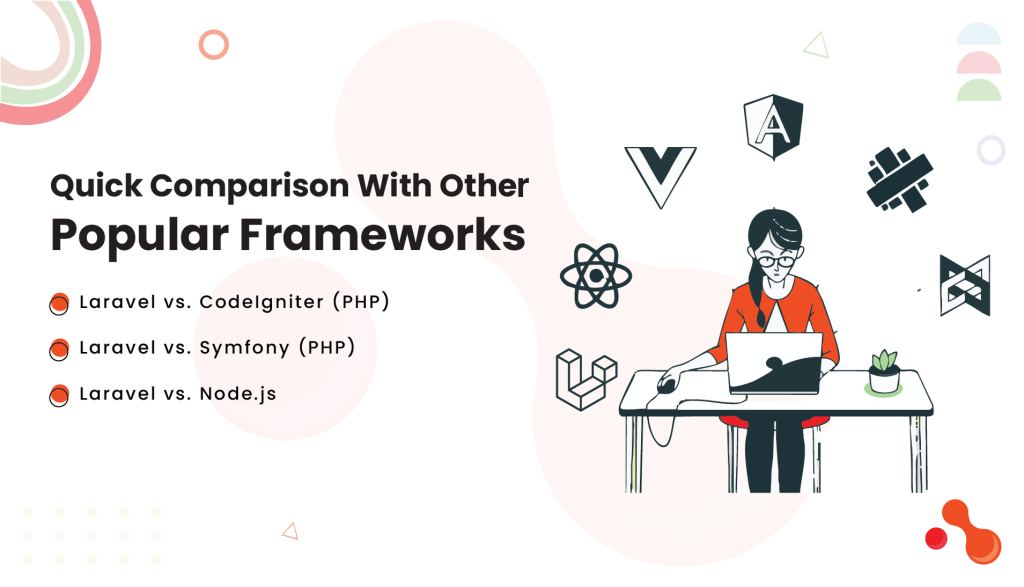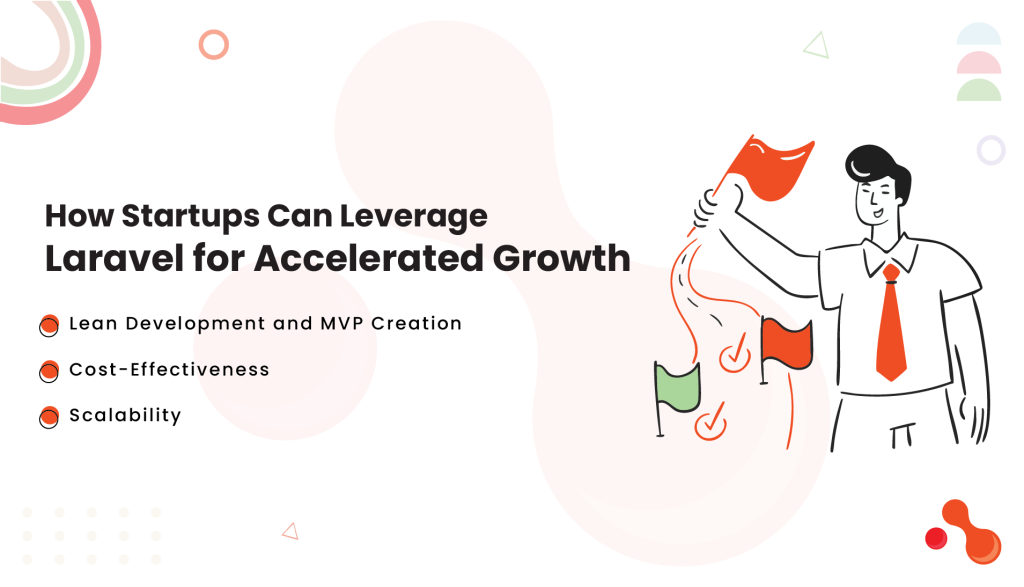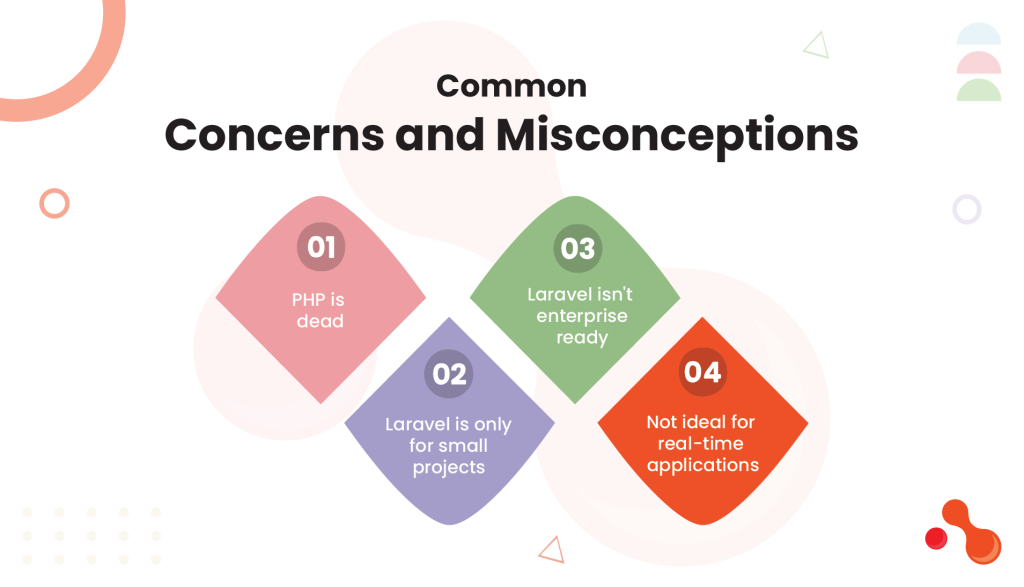Introduction
Businesses tend to focus on the basic concept of their idea and rightly so. It defines the very basis of their business structure and future strategies. That said, choosing the right development framework is equally important – it brings your ideas to life
The framework you choose can shape the entire direction of your software project. Different roles bring different priorities to the table. CEOs tend to focus on maximizing ROI and reducing long-term risks, while CTOs concentrate on delivering scalable, maintainable, and technically sound solutions.
That’s why your choice of web development framework matters more than it may seem at first. Laravel is a powerful PHP framework however, while selecting an appropriate framework businesses tend to wonder:
- What are the benefits of Laravel?
- Is Laravel for startups and enterprises?
- Why choose Laravel for web development?
This article offers a deep dive into Laravel’s technical and business value. It lists five very good reasons why Laravel is the top pick.
5 Reasons to Choose Laravel
Choosing the right tech stack is like laying the foundation for a skyscraper — everything you build rests on it. If your development project is that skyscraper, then Laravel is the robust, well-engineered foundation that not only holds it all up but also accelerates its rise. However, there are many benefits of Laravel.
Here are some very good reasons to choose Laravel:
1. Built-In Laravel Security Practices Reduce Exposure Risk:
- Laravel has a proactive approach to security that will work in your favor. It protects your application from several security vulnerabilities. This includes SQL injection, cross-site scripting, and cross-site request forgery.
- Laravel encourages clean and readable syntax that promotes better team velocity.
- Laravel has high level compatibility with modern DevOps practices that make deployment smoother and rollback safer, reducing downtime and risk.
- Laravel delivers big when it comes to security, speed, and scalability. It is well integrated into the framework, which ensures secure authentication, input validation, and secure query execution.
2. Strong Testing Infrastructure Built-In:
- Testing is the key to delivering flawless solutions. With Laravel, there is no need to look very far. It includes an integrated testing environment. Built-in testing is one of the biggest benefits of Laravel.
- Laravel has built-in support for PHPUnit and Pest allowing developers to thoroughly test their application prior to launch.
- Laravel also supports a test-driven development (TDD) culture, reducing bugs and costly reworks later in the life cycle.
- The built-in testing makes it easy to maintain and extend.
- Laravel implements the MVC architecture that supports maintainability, enabling codebases to remain clean, logical, and well-documented. This ensures lower technical debt and a reduced total cost of ownership (TCO).
- All of these capabilities promote long-term viability for projects, even when teams change or scale. Laravel helps future-proof your web application and reduce unexpected expenses down the road.
3. Regular Updates & Upgrades:
- Laravel consistently provides timely updates which includes both security and feature updates – this too is one of the benefits of Laravel. Laravel releases major versions annually and long-term support (LTS) versions every two years. It maintains a predictable upgrade cycle that always includes many new and innovative features.
- Laravel 12 brings support for real-time features using WebSockets, improved job batching. This update along with several others make Laravel more suitable for live notifications, chat, and collaborative interfaces.
- Laravel Echo and Laravel Octane further strengthen their real-time capabilities, giving developers the tools to build highly responsive, concurrent applications.
4. Scalability and Performance – Building for Sustained Growth:
- Laravel is a robust framework. Developing scalable Laravel applications is breeze since its architecture supports scaling and it is designed for long-term growth.
- Laravel Octane enables blazing-fast performance by leveraging high-speed application servers like Swoole and RoadRunner.
- Laravel simplifies horizontal scaling and integrates seamlessly with caching systems like Redis and Memcached. This allows applications to handle thousands of concurrent users without hiccups.
- The modular structure enforces good coding practices thus allowing teams to build services independently and manage them efficiently.
- Maintainable codebases play a vital role especially for businesses that need to scale. Laravel’s features like service providers, events, queues, and jobs deliver this as well.
- Businesses can benefit from the Laravel ecosystem advantages. Laravel has a thriving ecosystem which is supported by tools like Nova and Vapor. This ensures business-centric development without starting from scratch. This mix of performance, structure, and tooling positions Laravel as a long-term ally in scaling digital products without losing speed or agility.
- Your tech stack should be a business decision, not a developer’s experiment. For projects seeking efficiency, scalability, and a rapid return on investment, Laravel isn’t just a preferred tool for developers; it’s a strategic business advantage.
5. Feature Rich:
- Eloquent ORM: Laravel eliminates raw SQL queries with Eloquent ORM thus increasing the security and modularity of your application. It means using intuitive PHP objects and simplifies querying, inserting and several other database operations.
- Blade Templating Engine: Laravel has a templating engine – Blade. It is a lightweight templating engine allowing one to build a custom interactive interface.
- Artisan CLI: This is a command line tool that helps automate repetitive tasks. It also generates boilerplate code, manages databases, and runs tests. It plays a big role in boosting Laravel developer productivity.
- Routing System: Laravel’s robust routing system helps handle route parameters, and organize your application’s URL structure efficiently.
- Database Migrations: Laravel’s migration system simplifies the process of managing database schema to ensure database consistency across different environments.
- Queues and Job Management: Laravel has an in-built queue system that has received a big update in the recent version 12. It is highly efficient in handling time-consuming tasks in the background to help improve the application’s performance.
- Task Scheduling: Laravel’s task scheduler allows you to define and manage recurring tasks directly within your application. This eliminates the need for complex cron job configurations.
- Libraries and Modular Design: Laravel encourages creating modular and reusable components. This helps enhance code organization and maintainability.
Quick Comparison of Laravel vs Other Frameworks

When making a framework decision, it’s helpful to understand Laravel’s position relative to other widely used options. While each framework has its merits, they cater to slightly different project needs and philosophies. A quick comparison with other popular frameworks will make it evident why Laravel is one of the best PHP frameworks for web development.
Laravel vs. CodeIgniter (PHP):
CodeIgniter is incredibly light and simple, with a tiny footprint. Developers often choose it for small projects or when they want to build almost everything themselves.
Laravel, while also lightweight, is a complete, full-stack framework. It offers many built-in features and an opinionated structure. This allows faster development for most standard web applications because it provides many common functionalities.
Laravel gives you a more comprehensive toolkit. It speeds up development and helps you create a more structured, maintainable codebase than CodeIgniter’s “do-it-yourself” method. It also helps you launch more quickly and keeps development costs predictable for more complex applications.
Laravel vs. Symfony (PHP):
Symfony is a highly modular, robust, and extensible framework. Developers often prefer it for very large, complex enterprise applications because it strictly follows best practices and offers incredible flexibility. It also forms the foundation for many other PHP projects, including parts of Laravel itself.
Laravel is often more developer-friendly and provides a faster initial development experience. It achieves this with more opinionated defaults and simpler syntax. While Symfony gives you immense power, it can have a steeper learning curve and demands more boilerplate setup.
Laravel strikes a better balance between power and developer productivity for a broader range of projects. This also means you achieve faster time-to-value without compromising enterprise-grade capabilities.
Laravel vs. Node.js:
Node.js is a JavaScript runtime that lets you use JavaScript for server-side development. Express.js and Nest.js are two popular frameworks. The main benefit of Node.js is that it is a full-stack JavaScript solution which tends to be simpler to code and manage.
On the other hand, Laravel is more mature, robust and stable. It is simple in every aspect and also simpler to understand. Node.js excels in real-time applications like chat apps or streaming however, with the recent update (version 12) Laravel introduces several new features making development real-time applications simpler.
Laravel ensures more secure backend development which is powered by PHP that is by a big margin the most popular programming language for server-side programming.
How Startups Can Leverage Laravel for Accelerated Growth

A startup is typically a firm with limited resources that work in high pressure to perform. What Laravel has to offer makes is the ideal framework for a startup:
- Lean Development and MVP Creation: Laravel happens to be the ideal pick to develop a Minimum Viable Product (MVP) quickly. Thus allowing startups to get a functional product to market with remarkable speed.
- Cost-Effectiveness: Laravel does not require a licensing fee and also supports rapid application development. Hence businesses looking for affordable Laravel development, will not be disappointed.
- Scalability: No one has a bigger need to scale than a startup. Laravel is a framework that is inherently scalable. This makes it ideal for startups that tend to have the need to scale fast as per the changing market conditions.
Real-World Success Stories
The impact of Laravel extends across various industries and company sizes, demonstrating its versatility and reliability in practice.
Here are several popular use cases followed by a case study:
- High-Traffic eCommerce Platforms: Laravel is the ideal framework to build an eCommerce platform. The fact that Laravel is highly scalable, and includes features like cashing and queues is highly beneficial for such a platform. For example, Bagisto is a Laravel eCommerce platform with an extensive features set that also offers headless commerce solutions.
- SaaS Applications: SaaS applications need a strong backend with exceptionally good security. Laravel fits the bill making it ideal to develop such applications. For example, Invoice Ninja is a popular open-source invoicing and billing platform for freelancers and small businesses. It is built on Laravel.
- Content Management Systems (CMS) and Publishing Platforms: A custom content management system needs to efficiently handle massive volumes of data and millions of readers. Laravel is well suited to develop high performing solutions for this purpose. For example, October CMS and Statamic are well-known Laravel-based CMS platforms.
- Enterprise Resource Planning (ERP) and Internal Tools: An ERP system requires a high level of automation, needs to be secure, highly performing and easy to scale. Laravel ticks all the boxes when it comes to the requirements. For example, Aureus ERP is a popular ERP solution developed using Laravel.
- Startup MVPs and Rapid Prototyping: Startups tend to prefer Laravel when it comes to developing an MVP for several good reasons already mentioned in the previous sections. For example, Barchat was developed using Laravel. It has now been transformed into a powerful financial data and stock market analysis platform but started as an MVP.
These examples highlight Laravel’s capacity to serve a broad spectrum of business needs, from consumer-facing applications handling massive user loads to complex internal systems that drive operational efficiency. Here is a real-world case study:
Case Study: Great Colorado Homes (U.S.-based real estate agency):
- Project Overview: Build a modern, feature-packed real estate portal to simplify buying, selling, and browsing properties in Colorado. The platform needed IDX/MLS integration, advanced search, user accounts, resource dashboards, property tour scheduling, favorites, blog, and market insights.
- Tech Stack: Backend with PHP with Laravel and Frontend with Tailwind CSS, Vite.
- Team Size & Duration: 3 developers, 1 UI/UX designer, 1 QA, and 1 PM over 2 years
- Why Laravel Was the Right Choice: Great Colorado Homes made the decision to hire cost-effective Laravel developers from Acquaint Softtech. Laravel was well suited for this project because of its robust built-in security features, and the fact that it supports rapid application development. Some of the other factors in its favor were that it is scalable, has a good ecosystem and ensures clean and maintainable code.
- Outcomes & Success: Acquaint Softtech delivered an excellent real-estate website that helped ease property transactions and increase revenue. Buyers, sellers, and agents lauded the intuitive layout and powerful functionality, particularly for property discovery.
Common Concerns and Misconceptions

The previous sections highlight the benefits of using Laravel. Choosing Laravel isn’t just selecting a framework — it’s choosing a foundation that accelerates development, strengthens security, and effortlessly scales with your project’s growth.
However, some misconceptions about PHP and Laravel tend to place businesses in two minds about the tech stack. Addressing these can help clarify the framework’s true capabilities:
- PHP is dead: This is far from true. PHP 8+, is a high-performance, strongly typed, and feature-rich language that powers a significant portion of the internet.
- Laravel is only for small projects: The reality is that Laravel has been used by enterprises and high-traffic platforms.
- Laravel is slow compared to other frameworks: The reality is that raw benchmarks can be misleading. Laravel offers robust performance out of the box and happens to be one of the most high performing web-frameworks.
- Too much magic makes It hard to debug: The reality is that the Laravel framework might seem complex to some. However, it is meant to enforce good coding practices and increase productivity. Laravel built-in tools ensure it is easy to debug.
- Laravel isn’t enterprise-ready: The reality is that Laravel supports DDD (Domain-Driven Design), hexagonal architecture, modular packages, multi-tenancy, and microservices. Hence is by all means enterprise ready.
- Not ideal for real-time applications: The reality is that Laravel supports real-time capabilities using Laravel Echo, WebSockets, and Broadcasting. Laravel 12 further improves native WebSocket support, making it well-suited for interactive applications.
- Frequent updates break things: There is no merit to this. Laravel is a highly modular framework hence custom solutions developed by implementing the best coding practices are not likely to break when new updates are introduced.
- Laravel is just another PHP framework: The reality is that Laravel leads in modern PHP development with robust tooling, built-in support for testing and much more making it far more powerful and developer-centric.
Make an Informed Strategic Decision
Businesses charting the course for their next development project have an important decision to make in terms of which framework to adopt. Laravel is the Swiss Army knife your development project needs — versatile enough to handle diverse requirements, powerful enough to streamline complex tasks, and reliable enough to deliver results every time.
It has a lot to offer in terms of features, maintainability, scalability and support for future updates. It also supports rapid development, robust security, inherent scalability, and long-term maintainability. This effectively means lower cost, faster market entry, risk mitigation. This means one can build faster with Laravel developers.
Hence Laravel is the ideal web framework irrespective of whether you’re a startup or an established enterprise. Hire Laravel developers from a well-established firm like Acquaint Softtech to gain the upper edge.






